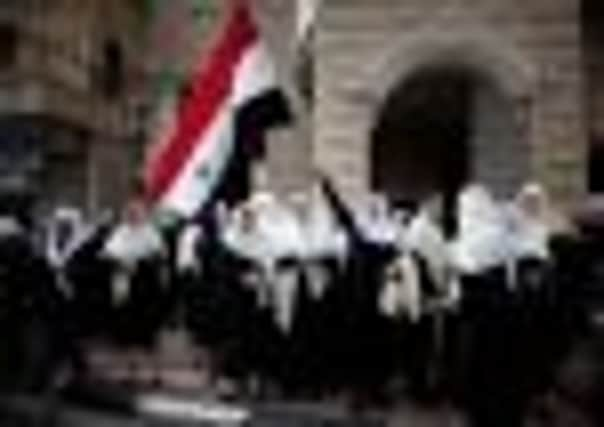Golan’s Druse break silence to criticise Syria’s brutality


In the snow-covered villages of this strategic highland, Druse are quietly breaking a long-standing code of silence and – for the first time since Israel captured the Golan from Syria in 1967 – holding protests against the Syrian government for its brutal crackdown on opponents. Anti-Syria graffiti has sprouted up, and hundreds of people have joined a Golan-linked Facebook group critical of Assad.
“Support for the opposition is growing each week, you could say, if not every day,” said Salman Fakhr Deen, a researcher at al-Marsad, a Golan-based human rights group. “But it isn’t dominant. It isn’t militant.”
Advertisement
Hide AdAdvertisement
Hide AdHe said that on several occasions in recent weeks, dozens and at time hundreds of protesters have gathered in the Golan’s main square, dominated by a sculpture of legendary Druse warrior Sultan Pasha Atrash, to raise their voices against the regime on the other side of the frontier.
These small gatherings are far from the crowds of hundreds of thousands, of raw emotion and fist-pumping anger, of the mass uprisings elsewhere in the Middle East over the past 14 months.
But the very act of stepping into the square is a major departure for the Golan’s 20,000-member Druse community, which historically has been extremely reluctant to openly criticise the autocratic Assad family that has ruled Syria for the past four decades.
Faced with the mounting scope of carnage in Syria, small numbers of Golan Druse are bringing their criticism out in the open.
The Druse are a secretive Islamic sect whose adherents live primarily in Syria, Israel, Lebanon and Jordan.
Israel captured the Golan Heights, a strategic plateau overlooking northern Israel, in the 1967 Six Day War and subsequently annexed the territory.
That move has never been internationally recognised, and Syria has demanded the return of the entire Golan as a condition for a peace.
Although they enjoy good relations with Israeli authorities, and a majority were born under the Israeli occupation, the Golan Druse identify emotionally and through family ties with Syria. Some residents study in Syria or travel there to marry.
Advertisement
Hide AdAdvertisement
Hide AdIn the early weeks of the uprising against Mr Assad last March, they lined up staunchly behind him, at least publicly. Those who expressed concern at Syria’s problems would often attribute them to the coterie around Mr Assad and not the Syrian leader himself. But the bloodletting has surged since.
In addition to the public protests, activists have scrawled graffiti or carried balloons reading “freedom”, “democracy” and “mass murder is a war crime”.
Ultimately, however, opponents and defenders of the Syrian regime want to preserve harmony in their mountain community, and the dissent has been peaceful, Mr Fakhr Deen said. The Druse of the Golan “don’t want their society riven over Assad”, he said.